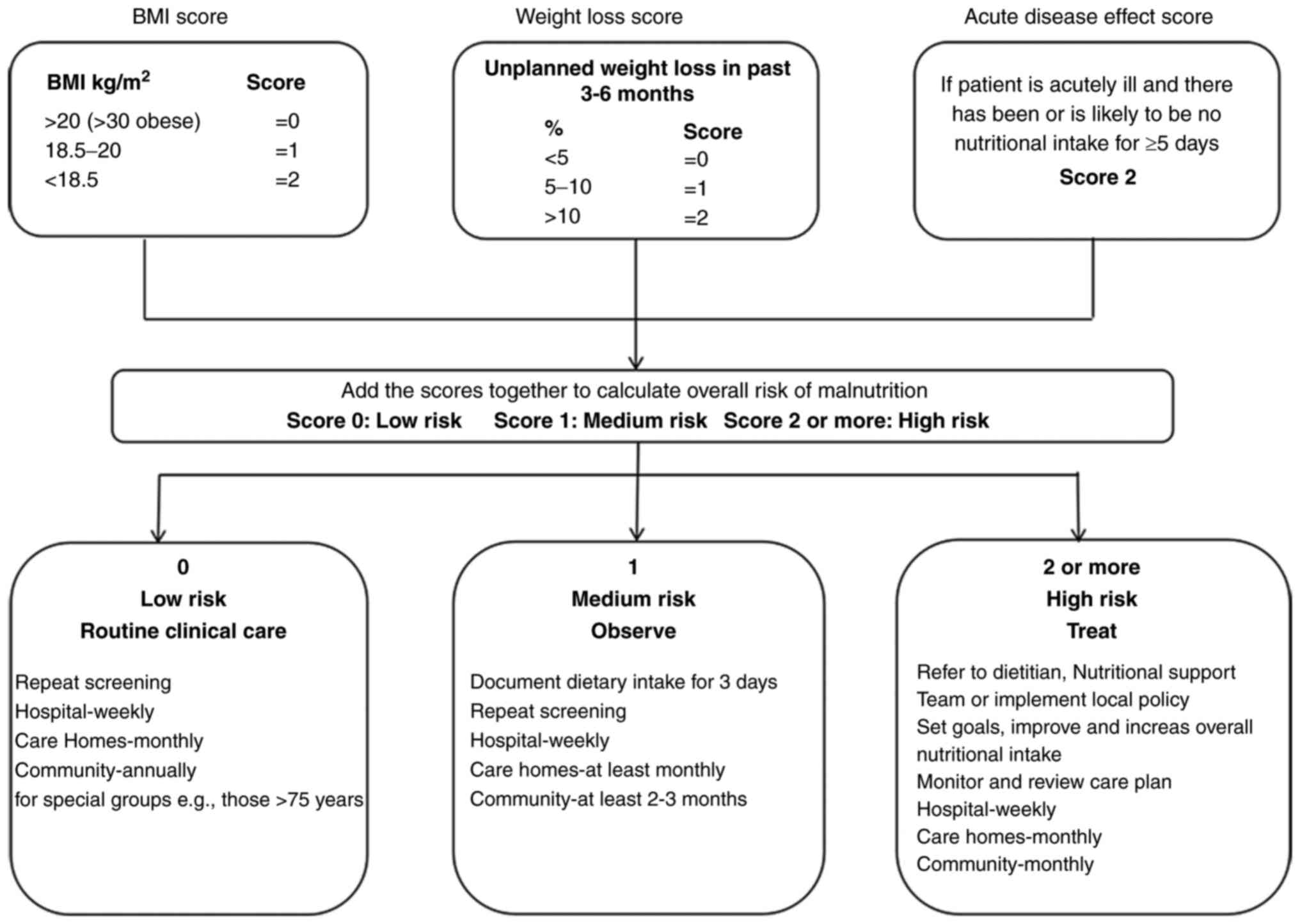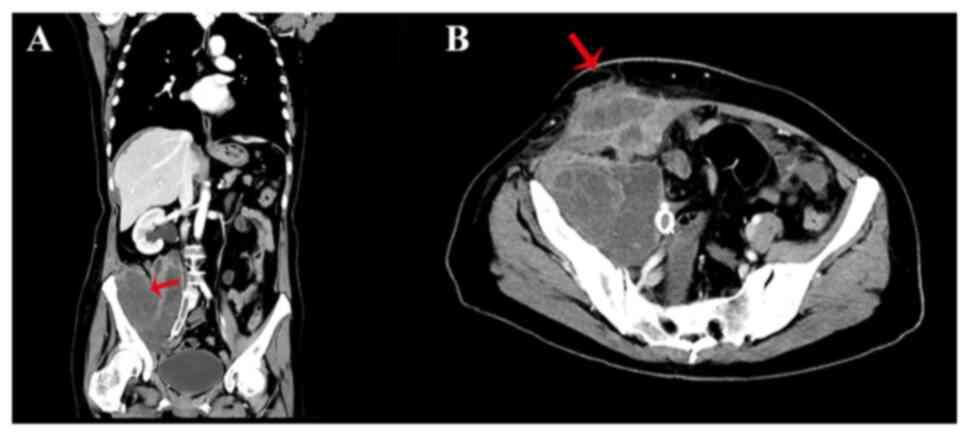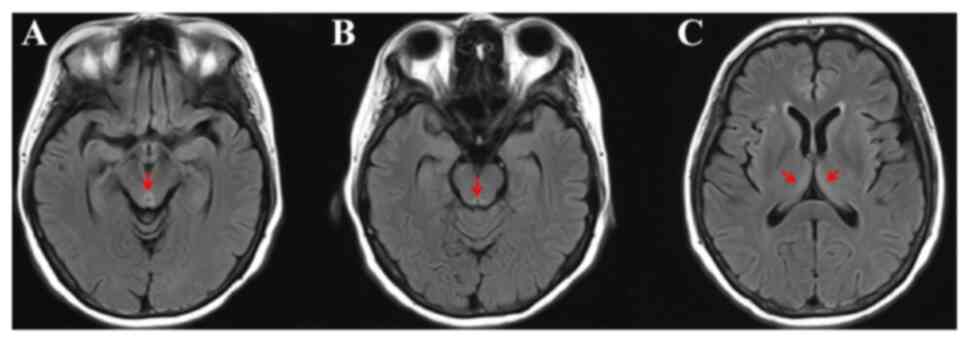|
1
|
Mrowicka M, Mrowicki J, Dragan G and
Majsterek I: The importance of thiamine (vitamin B1) in humans.
Biosci Rep. 43:BSR202303742023. View Article : Google Scholar : PubMed/NCBI
|
|
2
|
Soto-Martin EC, Warnke I, Farquharson FM,
Christodoulou M, Horgan G, Derrien M, Faurie JM, Flint HJ, Duncan
SH and Louis P: Vitamin biosynthesis by human gut
butyrate-producing bacteria and cross-feeding in synthetic
microbial communities. mBio. 11:e00886–20. 2020. View Article : Google Scholar : PubMed/NCBI
|
|
3
|
Cobilinschi C, Andrei CA, Grinţescu IM and
Mirea L: Metabolic failure due to thiamine deficiency during
critical illness. Curr Opin Clin Nutr Metab Care. 27:155–162. 2024.
View Article : Google Scholar : PubMed/NCBI
|
|
4
|
Hutcheon DA: Malnutrition-induced
Wernicke's encephalopathy following a water-only fasting diet. Nutr
Clin Pract. 30:92–99. 2015. View Article : Google Scholar : PubMed/NCBI
|
|
5
|
Yasu T, Iimura Y, Momo K and Kuroda S:
Potential thiamine deficiency in elderly patients with
gastrointestinal cancer undergoing chemotherapy. Int J Clin
Pharmacol Ther. 58:174–176. 2020. View
Article : Google Scholar : PubMed/NCBI
|
|
6
|
Sechi G and Serra A: Wernicke's
encephalopathy: New clinical settings and recent advances in
diagnosis and management. Lancet Neurol. 6:442–455. 2007.
View Article : Google Scholar : PubMed/NCBI
|
|
7
|
Galvin R, Bråthen G, Ivashynka A, Hillbom
M, Tanasescu R and Leone MA; EFNS: EFNS guidelines for diagnosis,
therapy and prevention of Wernicke encephalopathy. Eur J Neurol.
17:1408–1418. 2010. View Article : Google Scholar : PubMed/NCBI
|
|
8
|
Ota Y, Capizzano AA, Moritani T, Naganawa
S, Kurokawa R and Srinivasan A: Comprehensive review of Wernicke
encephalopathy: Pathophysiology, clinical symptoms and imaging
findings. Jpn J Radiol. 38:809–820. 2020. View Article : Google Scholar : PubMed/NCBI
|
|
9
|
Edge SB and Compton CC: The American Joint
Committee on Cancer: The 7th edition of the AJCC cancer staging
manual and the future of TNM. Ann Surg Oncol. 17:1471–1474. 2010.
View Article : Google Scholar : PubMed/NCBI
|
|
10
|
Stratton RJ, Hackston A, Longmore D, Dixon
R, Price S, Stroud M, King C and Elia M: Malnutrition in hospital
outpatients and inpatients: Prevalence, concurrent validity and
ease of use of the ‘malnutrition universal screening tool’ (‘MUST’)
for adults. Br J Nutr. 92:799–808. 2004. View Article : Google Scholar : PubMed/NCBI
|
|
11
|
Aiello EN, Pasotti F, Appollonio I and
Bolognini N: Equating mini-mental state examination (MMSE) and
montreal cognitive assessment (MoCA) scores: Conversion norms from
a healthy Italian population sample. Aging Clin Exp Res.
34:1721–1724. 2022. View Article : Google Scholar : PubMed/NCBI
|
|
12
|
Roheger M, Xu H, Hoang MT, Eriksdotter M
and Garcia-Ptacek S: Conversion between the mini-mental state
examination and the montreal cognitive assessment for patients with
different forms of dementia. J Am Med Dir Assoc. 23:1986–1989.e1.
2022. View Article : Google Scholar : PubMed/NCBI
|
|
13
|
Thomson AD, Guerrini I and Marshall EJ:
Wernicke's encephalopathy: Role of thiamine. Pract Gastroenterol.
33:21–30. 2009.
|
|
14
|
Huskisson E, Maggini S and Ruf M: The
influence of micronutrients on cognitive function and performance.
J Int Med Res. 35:1–19. 2007. View Article : Google Scholar : PubMed/NCBI
|
|
15
|
Baltrusch S: The Role of Neurotropic B
Vitamins in Nerve Regeneration. Biomed Res Int. 2021.9968228. 2021.
View Article : Google Scholar : PubMed/NCBI
|
|
16
|
Kril JJ: Neuropathology of thiamine
deficiency disorders. Metab Brain Dis. 11:9–17. 1996. View Article : Google Scholar : PubMed/NCBI
|
|
17
|
Butterworth RF: Thiamin deficiency and
brain disorders. Nutr Res Rev. 16:277–284. 2003. View Article : Google Scholar : PubMed/NCBI
|
|
18
|
Zhang Y, Wang L, Jiang J and Chen WY:
Non-alcoholic Wernicke encephalopathy in an esophageal cancer
patient receiving radiotherapy: A case report. World J Clin Cases.
10:5810–5815. 2022. View Article : Google Scholar : PubMed/NCBI
|
|
19
|
Nikjoo A, Rashid H, Chung R and Sadat MA:
A rare case of Wernicke encephalopathy in stage IV gastric cancer.
Neurocase. 28:123–125. 2022. View Article : Google Scholar : PubMed/NCBI
|
|
20
|
Lin Q, Li G, Wang Z and Zhang Y: Case
Report: Wernicke's encephalopathy after gastric surgery presenting
as lactic acidosis and refractory thrombocytopenia. Front Surg.
10:10163472023. View Article : Google Scholar : PubMed/NCBI
|
|
21
|
Gross A, Yu AT, Lara-Reyna J, Park K and
Harvey EJ: Duodenal adenocarcinoma in the setting of bariatric
surgery: A perfect storm for Wernicke's encephalopathy. Cureus.
15:e337652023.PubMed/NCBI
|
|
22
|
Koca O, Demir B, Derin S and Turna ZH: A
case report of Wernicke Korsakoff syndrome in a patient with
cholangiocellular carcinoma: An underestimated cause of
encephalopathy in cancer patients. Medicine (Baltimore).
101:e319042022. View Article : Google Scholar : PubMed/NCBI
|
|
23
|
Ibnawadh AK, Alashgar HI, Peedikayil M and
Amin T: Pancreatic cancer presenting with acute pancreatitis
complicated by Wernicke's encephalopathy and a colonic fistula: A
case report. Ann Med Surg (Lond). 85:574–578. 2023. View Article : Google Scholar : PubMed/NCBI
|
|
24
|
Slim S, Ayed K, Triki W, Baccar A, Baraket
O, Rahal K, Ganzoui I and Bouchoucha S: Gayet-Wernicke's
encephalopathy complicating prolonged parenteral nutrition in
patient treated for colonic cancer-a case report. BMC Nutr.
8:832022. View Article : Google Scholar : PubMed/NCBI
|
|
25
|
Brown S and Hutt-Williams S: Wernicke's
encephalopathy in advanced cancer. BMJ Support Palliat Care.
12:460–462. 2022. View Article : Google Scholar : PubMed/NCBI
|
|
26
|
Azapagasi E, Kunt Baykal N, Kirkiz Kayali
S, Salimli Mirzayeva L, Topuz Türkcan B, Uysal Yazici M, Serdaroğlu
E and Kaya Z: Severe lactic acidosis, Wernicke's encephalopathy,
and wet beriberi due to thiamine deficiency in a child with
leukemia. Klin Padiatr. 236:193–196. 2024. View Article : Google Scholar : PubMed/NCBI
|
|
27
|
Feng Y, Long X and Li X: Wernicke
encephalopathy with extensive cortical lesions combined with
diffuse large B-cell lymphoma. Neuro Endocrinol Lett. 43:361–365.
2022.PubMed/NCBI
|
|
28
|
Malik S, White W and Dasanu CA: Unusual
encephalopathy with Wernicke-Korsakoff syndrome-like features due
to adjuvant nivolumab for malignant melanoma. J Oncol Pharm Pract.
30:408–411. 2024. View Article : Google Scholar : PubMed/NCBI
|
|
29
|
Harper CG, Giles M and Finlay-Jones R:
Clinical signs in the Wernicke-Korsakoff complex: A retrospective
analysis of 131 cases diagnosed at necropsy. J Neurol Neurosurg
Psychiatry. 49:341–345. 1986. View Article : Google Scholar : PubMed/NCBI
|
|
30
|
Nardone R, Höller Y, Storti M, Christova
M, Tezzon F, Golaszewski S, Trinka E and Brigo F: Thiamine
deficiency induced neurochemical, neuroanatomical, and
neuropsychological alterations:a reappraisal.
ScientificWorldJournal. 2013:3091432013. View Article : Google Scholar : PubMed/NCBI
|
|
31
|
Donnino MW, Vega J, Miller J and Walsh M:
Myths and misconceptions of Wernicke's Encephalopathy: What every
emergency physician should know. Ann Emerg Med. 50:715–721. 2007.
View Article : Google Scholar : PubMed/NCBI
|
|
32
|
Thomson AD, Cook CC, Touquet R and Henry
JA; Royal College of Physicians, : London: The Royal College of
Physicians report on alcohol: Guidelines for managing Wernicke's
encephalopathy in the accident and emergency department. Alcohol
Alcohol. 37:513–521. 2002. View Article : Google Scholar : PubMed/NCBI
|
|
33
|
Cantu-Weinstein A, Branning R, Alamir M,
Weleff J, Do M, Nero N and Anand A: Diagnosis and treatment of
Wernicke's encephalopathy: A systematic literature review. Gen Hosp
Psychiatry. 87:48–59. 2024. View Article : Google Scholar : PubMed/NCBI
|
|
34
|
Dingwall KM, Delima JF, Binks P, Batey R
and Bowden SC: What is the optimum thiamine dose to treat or
prevent Wernicke's encephalopathy or Wernicke-Korsakoff syndrome?
Results of a randomized controlled trial. Alcohol Clin Exp Res.
46:1133–1147. 2022. View Article : Google Scholar : PubMed/NCBI
|
|
35
|
Stephen JM, Grant R and Yeh CS:
Anaphylaxis from administration of intravenous thiamine. Am J Emerg
Med. 10:61–63. 1992. View Article : Google Scholar : PubMed/NCBI
|
|
36
|
Tjugum SL, Hedrick TL, Jean SJ, Heeney SA,
Rohde KA and Campbell-Bright SL: Evaluation of the safety of
intravenous thiamine administration in a large academic medical
center. J Pharm Pract. 34:397–402. 2021. View Article : Google Scholar : PubMed/NCBI
|
|
37
|
Ott M and Werneke U: Wernicke's
encephalopathy - from basic science to clinical practice. Part 1:
Understanding the role of thiamine. Ther Adv Psychopharmacol.
10:20451253209781062020. View Article : Google Scholar : PubMed/NCBI
|
|
38
|
Dyckner T, Ek B, Nyhlin H and Wester PO:
Aggravation of thiamine deficiency by magnesium depletion. A case
report. Acta Med Scand. 218:129–131. 1985. View Article : Google Scholar : PubMed/NCBI
|
|
39
|
Victor M, Adams RD and Collins GH: The
Wernicke-Korsakoff syndrome. A clinical and pathological study of
245 patients, 82 with post-mortem examinations. Contemp Neurol Ser.
7:1–206. 1971.PubMed/NCBI
|


















